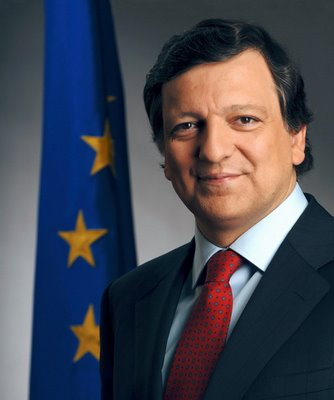Moving Forward Europe. Barroso at the EPC

Sunny day in Brussels. Weird, but real. You know, these things sometimes (twice in a month or so) happen. Is it a nice prelude of what’s about to happen in the European capital in only a couple of days? We don’t know yet, of course, but hopefully, the words that have come today from the President of the Commission are not only words but also actions. Actions that can, at least for a while, calm the markets.
It hasn’t been my first visit to the European Policy Centre, one of the leading think tanks in European affairs, which has its headquarters in the Residence Palace, 155 rue de la Loi, a strategic position between the Committee of the Regions and the European Parliament, and surrounded by many more European buildings. No, it hasn’t been my first visit. The first one, actually, was almost a month ago, on 30th May, when Mario Draghi, the President of the ECB, participated in a discussion about growth in Europe.
So, what has Barroso talked about? Obviously, fiscal consolidation. Obviously, growth. Obviously, more Europe. On the eve of the European Council, he’s given some ideas of where agreements can be achieved in the frame of the “New Deal” on growth wished by the EPC. The three pillars being a Banking Union, a Fiscal Union and a Political Union, only the first one can come into effect quickly and without a treaty change. So, if there’s no surprise, we’ll see the announcement of this Banking Union in a couple of days, in order to prevent disasters like the ones we’ve suffered. Digital single market and project bonds have been mentioned as well.

He’s also underlined the commitment of the European Commission to the unity and not division or fragmentation of the EU. This could seem paradoxical to some people when he admits, by “being realistic” that even if the kick-off to all of the possible agreements are the 27 Member States, some of them will do as United Kingdom or Denmark have already done before, having opt-outs. It seems paradoxical too when we see the President of the Commission saying that “the pace of the EU cannot be the pace of its slowest member”, when he assures that the EC doesn’t want a Grexit (Greece exit of the Euro) but doesn’t assure it’s not going to happen, or when he talks about “conditionality” giving the funds (for projects for innovation or sustainable energy, for instance).
In the current stage of financial and economic crisis, it’s true that other characteristics of the European Union, such as the worry for Human Rights, not only in Europe but also in a worldwide level, seem to be forgotten, but Barroso says the EU doesn’t miss the focus. The EC is also worried for the Climate Change, more political accountability and deepening of the democratization in a EU-level, but highlights that the first concern right now is the growth, a growth which “is for jobs”, as “employment is the first social policy”.
Finally, he’s talked a lot about the necessity of more Europe. As a result of the globalization, the economy nowadays is very dependent on Europe, so in the last G-20 celebrated in Mexico, Barroso has told us that he was surprised to be asked for more integration in the EU by other actors such as USA, China or Russia, who now think it’s essential for them too. Anyway, to achieve this, an engagement at a national level is mandatory: it’s counterproductive to take a stance in Brussels and then take a completely different when you return home. At the same time, some countries that are for the Political Union in a theoretical speech, when it comes to reality, and they have to transfer competencies, they’re not that much.
So…28-29 June, European Council. Will we have good news? And by that I don’t mean Spain reaching the final of the EURO 2012…